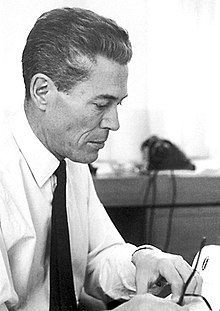
Back Jacques Monod AN جاك مونو Arabic جاك مونو ARZ ژاک مونو AZB Жак Мано Byelorussian Жак Моно Bulgarian জাক মোনোদ Bengali/Bangla Jacques Monod BS Jacques Monod Catalan جاکیوس مۆنۆد CKB
Jacques Monod | |
|---|---|
 | |
| Born | Jacques Lucien Monod 9 February 1910 |
| Died | 31 May 1976 (aged 66) |
| Education | Sorbonne |
| Known for | |
| Awards |
|
| Scientific career | |
| Fields | |
| Institutions | Pasteur Institute |
Jacques Lucien Monod (9 February 1910 – 31 May 1976) was a French biochemist who won the Nobel Prize in Physiology or Medicine in 1965, sharing it with François Jacob and André Lwoff "for their discoveries concerning genetic control of enzyme and virus synthesis".[2][3][4][5][6][7]
Monod and Jacob became famous for their work on the E. coli lac operon, which encodes proteins necessary for the transport and breakdown of the sugar lactose (lac). From their own work and the work of others, they came up with a model for how the levels of some proteins in a cell are controlled. In their model, the manufacture of a set of related proteins, such as the ones encoded within the lac (lactose) operon, is prevented when a repressor protein, encoded by a regulatory gene, binds to its operator, a specific site in the DNA sequence that is close to the genes encoding the proteins. (It is now known that a repressor bound to an operator physically blocks RNA polymerase from binding to the promoter, the site where transcription of the adjacent genes begins.)
Study of the control of expression of genes in the lac operon provided the first example of a system for the regulation of transcription. Monod also suggested the existence of messenger RNA molecules that link the information encoded in DNA and proteins. For these contributions he is widely regarded as one of the founders of molecular biology.[8][9]
- ^ Cite error: The named reference
Lwoff-385was invoked but never defined (see the help page). - ^ "The Nobel Prize in Physiology or Medicine 1965 François Jacob, André Lwoff, Jacques Monod". Nobelprize.org. Retrieved 30 June 2010.
- ^ The Statue Within: an autobiography by François Jacob, Basic Books, 1988. ISBN 0-465-08223-8 Translated from the French. 1995 paperback: ISBN 0-87969-476-9
- ^ Chance and Necessity: An Essay on the Natural Philosophy of Modern Biology by Jacques Monod, New York, Alfred A. Knopf, 1971, ISBN 0-394-46615-2
- ^ Of Microbes and Life, Jacques Monod, Ernest Bornek, June 1971, Columbia University Press, ISBN 0-231-03431-8
- ^ The Eighth Day of Creation: makers of the revolution in biology by Horace Freeland Judson, Simon and Schuster, 1979. ISBN 0-671-22540-5. Expanded Edition Cold Spring Harbour Laboratory Press, 1996. ISBN 0-87969-478-5. History of molecular biology recounted through the lives and work of the major figures, including Monod.
- ^ Origins of Molecular Biology: a Tribute to Jacques Monod edited by Agnes Ullmann, Washington, ASM Press, 2003, ISBN 1-55581-281-3. Jacques Monod seen by persons who interacted with him as a scientist.
- ^ Ullmann, Agnès (2003). Origins of molecular biology: a tribute to Jacques Monod. ASM Press. p. xiv. ISBN 1-55581-281-3.[permanent dead link]
- ^ Stanier, R. (1977). "Jacques Monod, 1910–1976". Journal of General Microbiology. 101 (1): 1–12. doi:10.1099/00221287-101-1-1. PMID 330816.
© MMXXIII Rich X Search. We shall prevail. All rights reserved. Rich X Search